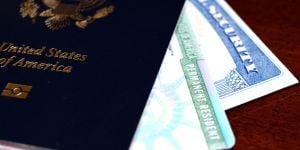
Recruiters often review your online presence. What content are you sharing on Instagram or Facebook? How does your LinkedIn profile appear? Less commonly known is that some countries also examine your social media activity during the visa application process. How might this affect your residence permit application? What should you be mindful of?
Countries that may examine your social media content
The United States
The US clearly states that visa applicants must provide usernames for any social media platforms they've used in the past five years, including Facebook, X, Instagram, YouTube, and LinkedIn. This requirement aims to uncover any potential threats to national security, particularly regarding possible terrorist activities. Expressing extremist opinions and engaging in illegal behavior are also grounds for disqualification.
In 2020, a Palestinian student bound for Harvard was barred from entering the United States after officials examined his social media contacts. Though he had not personally posted objectionable content, his connections with individuals who had disseminated anti-American material resulted in his visa being revoked. Despite his assertions that he had neither liked nor reposted any anti-American content himself, his application was ultimately rejected.
Australia
Australian immigration policies stress the importance of an applicant's "good character," which includes scrutinizing social media activity. Those applying for permanent residency, long-term work visas, or student visas may undergo a social media review to assess their eligibility to enter the country.
For instance, an immigration lawyer highlights a case involving a student visa. If an applicant's social media shows they are working full-time while holding a student visa, it could lead to immediate visa revocation for breaching the visa's conditions. Additionally, in applications for partner or spouse visas, the authenticity of the relationship can be scrutinized through social networks to verify the genuine connection between the partners.
The Schengen area
Recent developments indicate potential increases in social media scrutiny for Schengen visa applicants. Although not yet confirmed, German police have suggested, mirroring the practices in the United States and Australia, that applicants' social media accounts be reviewed. According to German authorities, the primary aim of this initiative is to assess fraud risk. They also recommend creating "risk profiles" based on criteria such as gender, age, origin, and travel purpose.
Countries like Canada and the United Kingdom also conduct social media checks for visa applicants, though their approaches appear less systematic than those of the United States.
The controversial nature of social media checks
Social media profiles are inherently public, yet using them as a basis for visa decisions has raised numerous concerns among citizen rights advocacy groups. The American approach is particularly contentious.
According to The Brennan Center for Justice, an independent organization dedicated to upholding democratic values and legal principles, the method of examining social networks presents multiple challenges. These include issues with interpretation, particularly when posts are in languages other than English or derive from different cultural contexts.
For instance, a British national was denied entry at a Los Angeles airport after Homeland Security misinterpreted a tweet about "digging up Marilyn Monroe's grave," which was actually a reference to a TV show. The complications of interpreting social media are exacerbated when the process is automated, often relying on simple keyword searches that yield a vast number of irrelevant results. This was demonstrated when a US police department's search for online bomb threats mostly turned up mentions of "explosive" pizzas.
The extended storage of vast quantities of personal data, not necessarily linked to any suspicion of criminal behavior, also poses significant privacy and data misuse risks, undermining the principles of privacy in democratic societies. How artificial intelligence might improve the accuracy and relevance of sensitive information searches remains an open question.
How to be on the safe side when applying for a visa
When applying for visas, such as skilled worker visas, it's crucial to ensure that your LinkedIn profile is up-to-date and aligns with the qualifications and experiences listed in your application. Discrepancies in your professional background, educational achievements, or personal details can raise red flags and potentially delay your visa processing.
It's also wise to manage your privacy settings across your social networks. For example, consider setting your Instagram account to private, particularly if you post personal or politically sensitive content. Immigration authorities won't ask for your passwords; they can only see what is publicly available.
Before submitting a visa application, review and possibly delete any old posts that could be seen as offensive, controversial, or inconsistent with the persona you present in your application. This is especially important for posts made within the last five years. Removing potentially sensitive content is often a safer option than refusing to provide your social media handles during the US visa application process, as non-compliance could lead to outright rejection of your application.



















